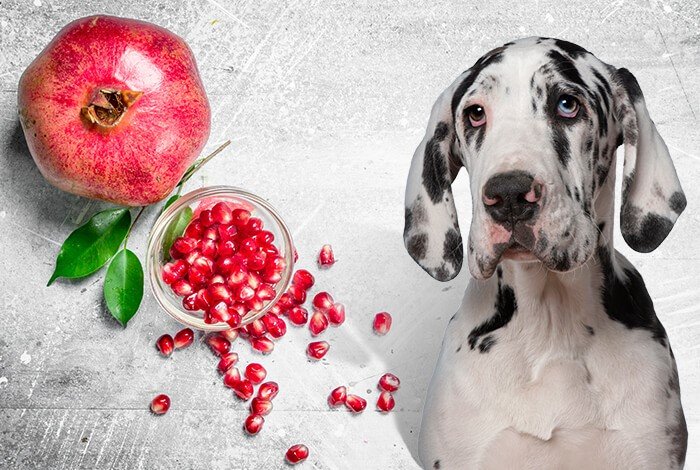Are Pomegranates Safe for Dogs? Vet-Reviewed Nutrition Insights
Pomegranates have gained popularity as a superfood for humans, but what about our dogs? As pet owners, we often wonder if the foods we enjoy are safe to share with our dogs. In this guide, we'll explore the safety of pomegranates for dogs, delve into their nutritional value, and provide expert insights from veterinarians.
Understanding Pomegranates
Pomegranates are vibrant, ruby-red fruits packed with juicy seeds called arils. These fruits are known for their high antioxidant content, particularly polyphenols, which have been linked to various health benefits in humans.
Can Dogs Eat Pomegranates?
The short answer is: It is complicated. While pomegranates are not toxic to dogs, they can cause digestive issues if consumed in large quantities.
The Good: Potential Benefits
Pomegranates contain several nutrients that could be beneficial for dogs:
- Antioxidants: These compounds help fight free radicals and may support overall health.
- Fiber: Pomegranates are a good source of dietary fiber, which can aid in digestion.
- Vitamins and Minerals: They contain vitamin C, potassium, and other essential nutrients.
The Bad: Potential Risks
Despite these benefits, there are some concerns about feeding pomegranates to dogs:
- Digestive Upset: The tannins in pomegranates can cause stomach discomfort, vomiting, or diarrhea in some dogs.
- Choking Hazard: The seeds can pose a choking risk, especially for smaller dogs.
- Intestinal Blockage: Consuming large amounts of pomegranate rind or seeds could potentially cause an obstruction.
What Veterinarians Say?
Dr. Jerry Klein, Chief Veterinary Officer for the AKC, states, "Pomegranates are not toxic to dogs. However, that doesn't mean that the fruit is safe for dogs to eat." He emphasizes that while a few seeds might not cause harm, larger quantities could lead to digestive issues or blockages.
Dr. Emily Singler, VMD, adds that while small amounts of pomegranate are generally fine for dogs, it is always best to consult with your veterinarian before introducing new foods to your pet's diet.
Safe Ways to Incorporate Pomegranate

If you are interested in offering pomegranate to your dog, consider these safer alternatives:
- Pomegranate Extract: Some studies suggest that pomegranate extract may have health benefits for dogs, particularly for digestive and heart health.
- Dog-Specific Treats: Look for commercial dog treats that contain pomegranate as an ingredient, as these are formulated with canine safety in mind.
Alternatives to Pomegranate
If you are looking for safe, antioxidant-rich fruits for your dog, consider these options:
- Blueberries: These are packed with antioxidants and are generally safe for dogs in moderation.
- Strawberries: Another antioxidant-rich fruit that many dogs enjoy.
- Apples: Remove the seeds and core, and apples can be a healthy, crunchy treat for dogs.
Monitoring Your Dog's Diet
When introducing any new food to your dog's diet, including pomegranate or its derivatives, follow these guidelines:
- Start Small: Offer only a tiny amount at first to see how your dog reacts.
- Watch for Reactions: Monitor your dog for any signs of digestive upset or allergic reactions.
- Consult Your Vet: Always check with your veterinarian before making significant changes to your dog's diet.
The Importance of a Balanced Diet
While treats like pomegranate can be an occasional addition to your dog's diet, it's crucial to remember that the majority of their nutrition should come from a balanced, species-appropriate diet. Dr. Renee Schmid emphasizes, "Treats shouldn't make up more than 10% of your dog's daily calorie intake."
Pomegranate Products to Avoid
While fresh pomegranate might be okay in small amounts, certain pomegranate products should be strictly avoided:
- Chocolate-Covered Pomegranate Seeds: Chocolate is toxic to dogs, making this a dangerous combination.
- Pomegranate Juice: Often contains added sugars and may be too concentrated for dogs.
- Dried Pomegranate: The concentrated sugars in dried fruit can be harmful to dogs.
What to Do If Your Dog Eats Pomegranate?

If your dog has consumed a large amount of pomegranate, including the rind or many seeds, follow these steps:
- Don't Panic: Remember, pomegranate isn't toxic, but it may cause discomfort.
- Monitor Your Dog: Watch for signs of digestive upset or obstruction.
- Contact Your Vet: If you notice any concerning symptoms or if your dog ate a significant amount, call your veterinarian for advice.
The Future of Pomegranate in Dog Nutrition
Research into the benefits of pomegranate for dogs is ongoing. A 2017 peer-reviewed study suggested that pomegranate peel extract might aid in canine digestive health. As more studies are conducted, we may gain a better understanding of how pomegranate can be safely incorporated into canine diets.
FAQs
Q: Can puppies eat pomegranate?
A: It is best to avoid giving pomegranate to puppies. Their digestive systems are more sensitive, and the risks outweigh any potential benefits.
Q: How much pomegranate is safe for dogs?
A: If you choose to offer pomegranate, stick to very small amounts. A few arils (seeds) occasionally should be fine for most dogs, but always consult with your vet first.
Q: Can dogs eat pomegranate skin?
A: No, dogs should never eat pomegranate skin or rind. These parts are tough to digest and can cause blockages.
Q: Are there any dogs that absolutely shouldn't eat pomegranate?
A: Dogs with sensitive stomachs, a history of pancreatitis, or those on special diets should avoid pomegranate. Always check with your vet if you are unsure.
Q: Can pomegranate cure any health issues in dogs?
A: While pomegranate has some health benefits, it is not a cure for any specific condition. A balanced diet and regular vet check-ups are key to maintaining your dog's health.
Conclusion
While pomegranates aren't toxic to dogs, they're not the ideal treat either. The potential risks of digestive upset and obstruction outweigh the nutritional benefits for most dogs. If you are interested in the health benefits of pomegranate for your canine companion, consider safer alternatives like dog-specific treats containing pomegranate extract or other dog-friendly fruits.
Remember, every dog is unique, and what works for one may not work for another. Always prioritize your dog's overall health and consult with your veterinarian before making any significant changes to their diet. By staying informed and making thoughtful choices, you can ensure your furry friend enjoys a safe, healthy, and balanced diet.
Sources-
https://www.akc.org/expert-advice/nutrition/can-dogs-eat-pomegranates/
https://www.petmd.com/dog/nutrition/can-dogs-eat-pomegranate
Join Our Community!
At Petzooie.com, we're more than just a website—we're a family of pet lovers who share your passion. Discover the best tips, advice, and resources for your beloved pets. Stay updated with our latest articles and join a vibrant community dedicated to pet care excellence. Follow us on Instagram @petzooie to stay up to date with our weekly blog articles!







